There are some traditions that have not gotten lost in time and are still respected. Every country and culture is different from one another, and India is a great example of this. People behave, eat, and even dress differently. They have their own traditions and customs, and as tourists, these need to be honored. And this is exactly what we’d like to bring forth in this article.
We at Bright Side have been mesmerized by the uniqueness of Indian culture, so we’d like to share with you a few useful tips to make the most out of your trip.
1. You must not touch books or instruments with your feet.
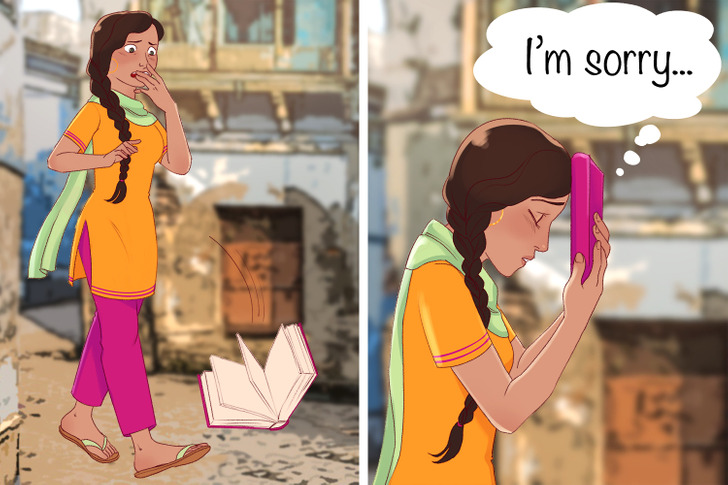
In India, children are taught from a young age that books are knowledge. They even have a Goddess of Learning, Saraswati. Therefore, touching books with one’s feet or even kicking a school bag full of notebooks or books is considered disrespectful.
Any instrument that is used to develop one’s knowledge is also considered very important and must not be touched by the feet. Even pens and pencils are important, according to Indian culture, and must be respected as such.
2. Don’t be afraid to explore Indian street food.

Exploring foreign cuisine is generally very important when visiting other countries, and sometimes the best food around is the kind made at that small corner vendor. And Indian food is no exception, as it’s one of the richest cuisines out there. It’s a must-try for sure. Just watch out for that extra-spicy food!
As with any street food experience, you must be careful. Seek fresh food, avoid milk products as they can sometimes be spoiled, avoid ice or water that was not heated well (definitely try to avoid tap water), and generally look forward to trying clean (and busy) vendors.
3. Don’t be too polite.

Saying “please” and “thank you” is normal and respectful for us, like at a restaurant or a shop. However, in India, when used too much, you can come across as rude or impolite. Who would’ve thought, right?
When it comes to friends and family, traditional ways of showing appreciation can sometimes create tension or express a level of formality that should not exist. Instead of saying “thank you,” you can try saying “I appreciate it.”
4. Only use your right hand when giving or taking anything.
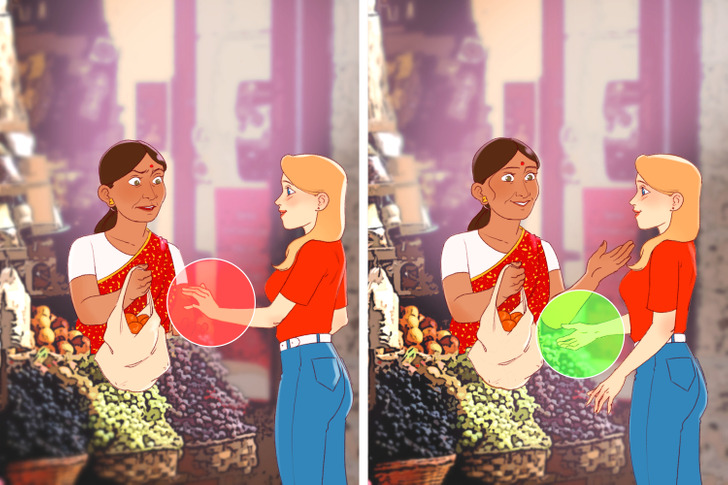
Many cultures have actually adopted this practice. In many cultures, the right hand is considered pure and even lucky! In India, it is believed that the left hand is impure, as it is used for cleaning shoes, feet, and generally dirty work. So when it comes to food, drinks, and handing objects to other people, we must always use the right hand to show respect.
5. Do not point your finger.
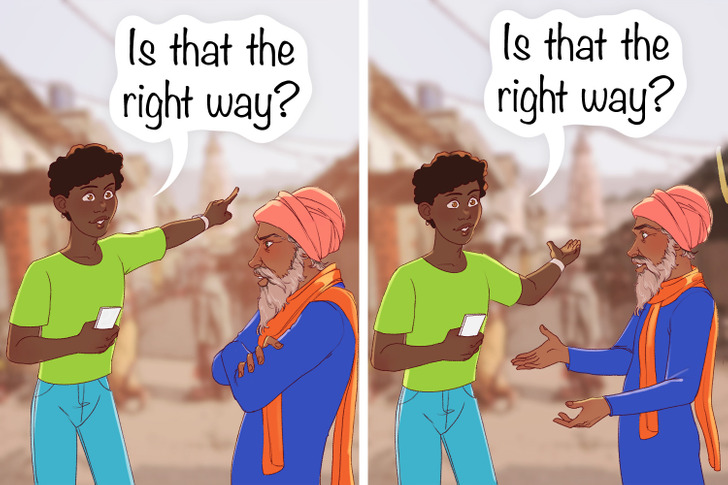
Usually, we use our pointer finger to give directions at a restaurant or generally when referring to something in particular. But this is definitely not the case in India.
Pointing your finger at an object or place is considered rude and impolite. If you wish to give directions or point out something to someone, you must do so by using your whole palm or your thumb. This way, it’s more gentle and polite.
6. Expect to use cash only.
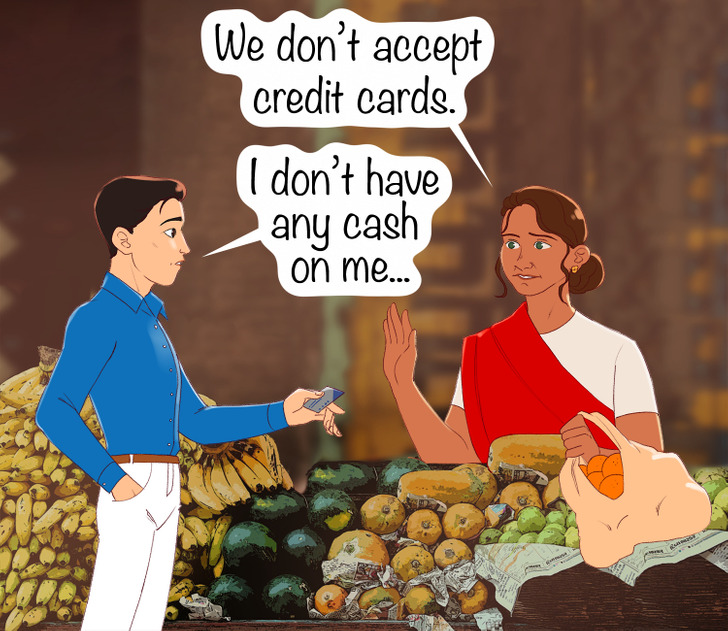
If you’re visiting a small town in India, you should expect to pay with cash most of the time. While in the bigger cities, malls, restaurants, and shops, credit or debit cards may be accepted, they are still rare, and the smaller cities make use of cash. So it would be smart to keep some cash with you, just in case.
7. Not everyone is going to speak English.
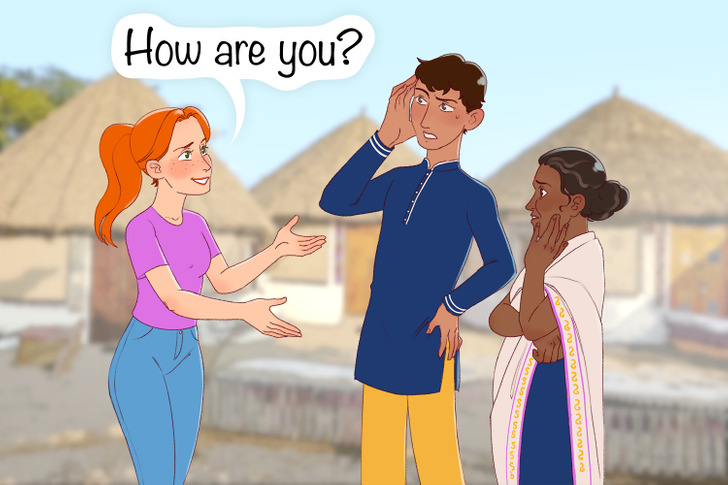
Of course, you might be lucky enough to be able to use English inside bigger cities, restaurants, hotels, or certain shops, however, this is not the case for smaller villages. Here, you should expect people to use their native language, which is not necessarily a bad thing.
Spending time among foreign people and hearing their native language might actually do you some good. You can pick up a new language, getting to know a new culture.
8. Learn about and use traditional greetings.
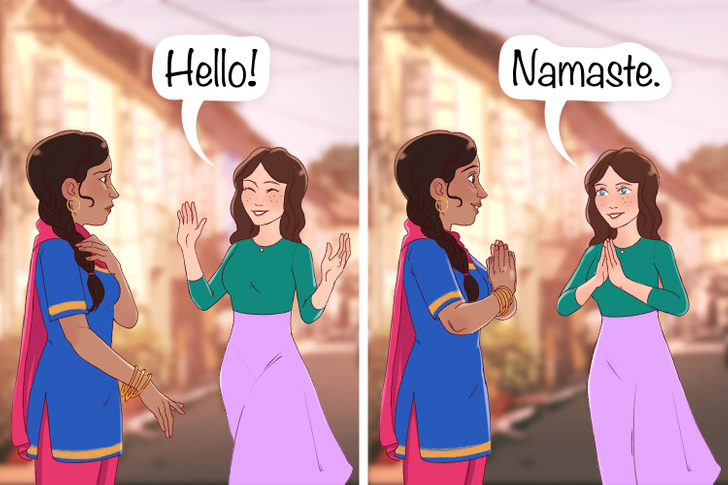
Respect is required everywhere you go in the world, and India is no exception. You can show your respect for the country and its people by learning about their culture and traditional greetings. One such greeting that is used in a general manner is “namaste.” You can put your palms together and bow to show respect while saying namaste, or, if you’d like to be more formal, you can use “namaskar.”
As English has become more globalized, “hello’’ is also used, especially among tourists and foreigners. Just know that “goodbye” is usually not used, as it implies you won’t be seeing each other anymore, or that you are asking for permission to leave.
9. Don’t use public displays of affection.
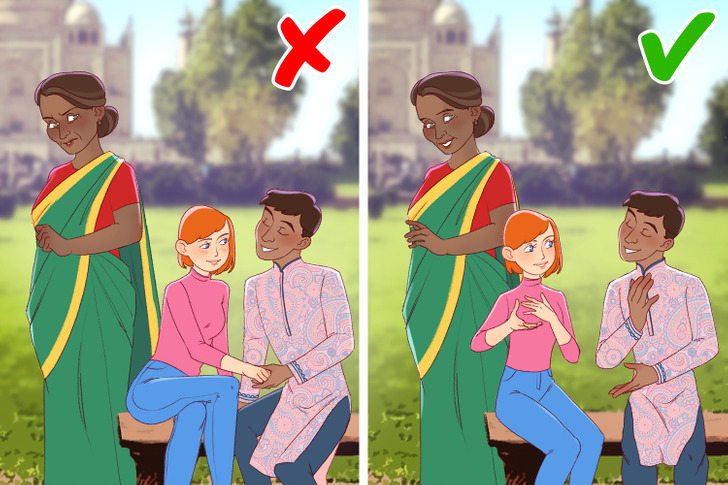
Public display of affection is generally looked down upon as it is quite a private thing. However, in India, you must not show affection in public. When you visit a new or foreign country, you might want to blend in with other people so as to not get unwanted stares. This is one of those things you must do.
Try and avoid holding hands or using overly affectionate gestures in public, as it is frowned upon. You can even spend time in jail!
10. Know that in small towns, you must wear decent clothes.

One of the most important things to keep in mind when coming to India is the way you present yourself. As a quite conservative country, it’s good to respect its culture and people, and you can start with your clothes. Even if it’s hot outside, try and cover yourself. This way, you can pay your respects to the country, and also make yourself look like a local.
If you’re visiting a particular attraction, it’s important to wrap a scarf around your head to show respect and politeness.
Have you ever traveled to India? Which aspect of Indian culture intrigues you the most?
A Common Nighttime Habit Cost Him His Sight

A 39-year-old man named Groeschen woke up one morning with an irritated eye. Initially suspecting allergies, he didn’t think much of it. However, as the discomfort worsened over the next few days, he decided to seek medical help.
At the Cincinnati Eye Institute, Groeschen received alarming news. He had contracted a bacterial infection caused by Pseudomonas. Doctors determined the likely culprit: sleeping in his contact lenses. This habit allowed the bacteria to thrive under the lenses, leading to a serious infection.
Despite being treated with antibiotics that eradicated the bacteria, the damage was already done. Groeschen developed a corneal ulcer, and the resulting scar tissue left him partially blind in the affected eye.
“It’s like trying to see through frosted glass,” doctors explained. “The infection eroded part of the cornea, and the scarring significantly impairs vision, even after the infection clears.”
To restore his sight, Groeschen will require a corneal transplant, a procedure with a lengthy recovery time of about a year.
As the owner of a design and restoration company, the vision loss made it challenging for him to keep up with his work. Reflecting on his experience, Groeschen pointed out that his contact lenses were labeled as safe for overnight wear, but he believes this advice should be reconsidered.
The American Academy of Ophthalmology has long warned about the dangers of wearing any type of contact lenses overnight, stating that it significantly increases the risk of eye infections.
Dr. William Faulkner, who treated Groeschen, emphasized, “The safest approach for eye health is to avoid sleeping in contact lenses altogether. Daily-wear disposable lenses are the best option for reducing risks.”
Other risky behaviors among contact lens users include using old lens cases for too long and failing to completely replace the cleaning solution after each use.
This story serves as an important reminder: seemingly harmless habits, like sleeping in contact lenses, can have serious consequences.
Please share this article to raise awareness and help others avoid similar risks.



Leave a Reply